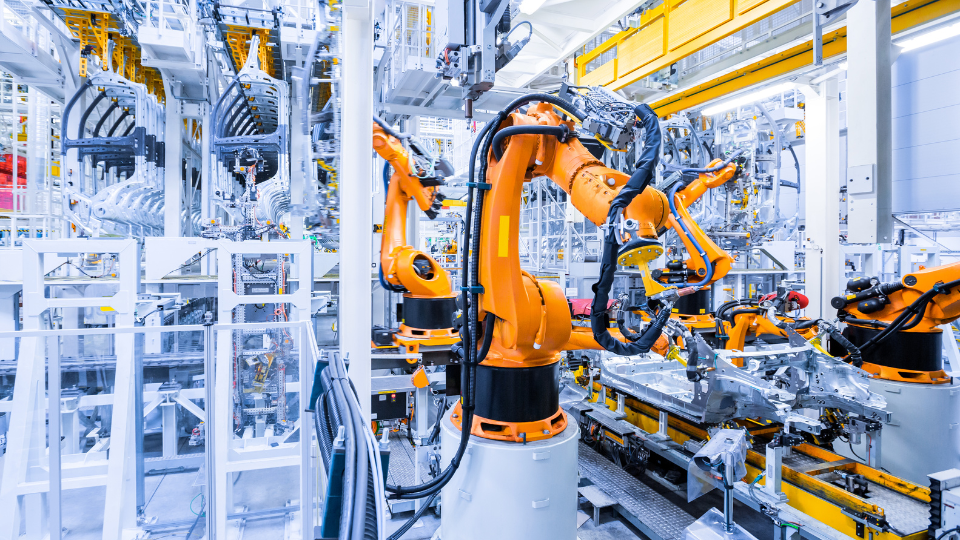Robert Bosch’s Way of Reducing the 7 Types of Waste for Higher Productivity
March 24, 2025
Robert Bosch GmbH, a global leader in technology and manufacturing, exemplifies how operational excellence is achieved through the elimination of waste. In highly competitive industries, every minute and material counts. That’s why Bosch embraces Lean Manufacturing and the Toyota Production System principles to minimize inefficiencies and maximize productivity.
Central to this is addressing the 7 types of waste, or muda, that creep into manufacturing processes. Bosch’s commitment to quality, efficiency, and continuous improvement has set a benchmark for manufacturers worldwide.
This blog dives into Bosch’s unique strategies to tackle each type of waste and offers actionable insights for others to follow.

Bosch’s Lean Manufacturing Culture
At the heart of Bosch’s productivity philosophy is the Bosch Production System (BPS)—a framework rooted in Lean principles but tailored to Bosch’s global operations. BPS emphasizes value creation, continuous improvement with Kaizen, and the active engagement of employees at all levels. Lean thinking isn’t just a toolkit at Bosch; it's embedded into the company’s DNA.
The culture at Bosch promotes standardized work, visual management, and process discipline. Every plant, whether in Germany, India, or Mexico, adheres to a shared set of principles, yet adapts them to local realities. This ensures flexibility without compromising on consistency.
Training is a key pillar. Bosch invests heavily in Lean training for operators, engineers, and even senior leaders. Regular Kaizen workshops, value stream mapping sessions, and daily Gemba walks create a culture of accountability and innovation.
Importantly, Bosch sees waste not just as a cost issue but as a barrier to customer satisfaction and sustainability. By empowering teams to identify and solve problems at the source, Bosch ensures that waste is not just reduced, but prevented. This proactive culture has helped Bosch maintain high product quality, low operational costs, and rapid delivery times, even in complex global supply chains.
Bosch’s Approach to Each Type of Waste
1. Overproduction
Overproduction occurs when more products are made than needed or are made too early. This leads to excess inventory and wasted resources.
Impact of Overproduction: Overproduction ties up capital, increases storage needs, and often masks deeper process inefficiencies. It’s considered the most dangerous waste as it amplifies all other forms of waste downstream.
Bosch’s Approach:
- Uses Just-in-Time (JIT) and pull systems to produce only what's needed.
- Implements Kanban to signal production based on actual demand.
- Aligns processes using takt time to synchronize output with customer needs.
- Empowers workers to stop production if excess is detected.
- Digital forecasting tools are used to anticipate demand and prevent surplus.
Bosch prioritizes flow over batch production. By making only what is necessary, when it’s needed, Bosch avoids piling up inventory and focuses on meeting real-time customer demand efficiently.
2. Inventory
Inventory waste includes raw materials, work-in-progress, or finished goods that are not actively being processed.
Impact of Inventory Waste: Excess inventory consumes space, increases handling and storage costs, and can lead to obsolescence or quality degradation.
Bosch’s Approach:
- Maintains low inventory buffers to reduce storage and handling costs.
- Uses vendor-managed inventory (VMI) systems with key suppliers.
- Employs digital MES to track and manage stock in real-time.
- Applies FIFO and cycle counting to maintain accuracy and flow.
- Regular audits ensure obsolete materials are identified and removed.
Bosch treats inventory as a liability, not an asset. By minimizing excess stock and tightly integrating with suppliers, they maintain agility and reduce carrying costs while ensuring smooth production flow.
3. Motion
Motion waste refers to unnecessary movement of people, equipment, or machinery that does not add value.
Impact of Motion Waste: Excessive motion can lead to fatigue, injury, inefficiency, and inconsistent work output, all of which hurt productivity.
Bosch’s Approach:
- Designs workstations using ergonomic principles to reduce operator movement.
- Conducts time-motion studies and uses digital twins to optimize layouts.
- Implements 5S methodology to keep tools and parts easily accessible.
- Deploys cobots for repetitive, non-value-adding tasks.
- Trains workers to standardize tasks and reduce wasted effort.
Bosch continuously studies operator motion and re-engineers tasks to be safer, faster, and simpler. Every unnecessary step is considered a hidden cost and is systematically eliminated.
4. Waiting
Waiting waste happens when people, machines, or materials are idle due to delays or process imbalances.
Impact of Excessive Waiting Period: Delays reduce throughput, increase lead time, and lower asset utilization, directly impacting profitability.
Bosch’s Approach:
- Uses takt time to synchronize workflows and eliminate idle time.
- Implements real-time dashboards for operational efficiency to flag delays instantly.
- Applies cellular manufacturing to reduce queue and handoff time.
- Trains multi-skilled workers for flexible task allocation.
- Uses predictive maintenance to minimize unplanned downtime.
Bosch ensures smooth production flow by attacking delays from every angle—technological, process-based, and organizational. When processes are balanced and downtime is anticipated, waiting waste becomes negligible.
5. Transportation
Transportation waste involves unnecessary movement of materials between processes or facilities.
Impact of Transportation Waste: It adds time, increases handling risks, and doesn’t add value to the product.
Bosch’s Approach:
- Designs U-shaped and flow-oriented layouts to minimize distance traveled.
- Uses Automated Guided Vehicles (AGVs) for internal material transport.
- Adopts point-of-use delivery to avoid long-distance material movement.
- Streamlines in-plant logistics with milk run systems.
- Applies layout simulations to reduce non-value-adding transport.
Bosch believes unnecessary transportation masks deeper inefficiencies. By bringing materials closer to the point of use and leveraging automation, they cut down time, space, and risk.
6. Overprocessing
Overprocessing happens when more work or higher-quality parts are produced than required by the customer.
Impact of Overprocessing: It wastes time, materials, and effort, often creating complexity without enhancing value.
Bosch’s Approach:
- Performs value-added analysis to eliminate redundant steps.
- Applies Six Sigma and Kaizen to streamline process stages.
- Avoids over-specification by designing processes to exact customer needs.
- Installs poka-yoke (error-proofing) to reduce inspection and rework.
- Monitors process efficiency with SPC (Statistical Process Control).
Bosch questions every task: does it add value from the customer’s perspective? If not, it’s simplified or removed. The goal is to deliver excellence—not overdo it.
7. Defects
Defects are products or services that don’t meet quality standards and require rework or scrapping.
Impact of Defects in Manufacturing: Defects are costly—they waste materials, time, and can damage customer trust and brand reputation.
Bosch’s Approach:
- Implements Six Sigma (DMAIC) to eliminate root causes of defects.
- Uses in-line quality checks and automated vision systems for early detection.
- Relies on predictive analytics to forecast and prevent quality issues.
- Encourages a zero-defect culture through Andon systems and employee empowerment.
- Embeds SPC and digital traceability into every critical process.
For Bosch, quality is not inspected in—it’s built in. They view defects as preventable, not inevitable, and use data, systems, and culture to ensure it stays that way.

Lessons for Other Manufacturers
Bosch’s journey offers key takeaways for manufacturers striving to eliminate waste and improve efficiency:
- Consistency in execution—Bosch aligns global operations under a unified Lean framework. This consistency enables predictable results and scalable improvements.
- Culture of ownership—Empowering employees to solve problems at the source creates lasting change. Everyone, from operators to management, plays a role.
- Digital readiness—Bosch integrates Industry 4.0 technologies to monitor, control, and optimize waste reduction in real-time.
Smaller manufacturers can start by mapping their value streams, identifying visible wastes, and implementing low-cost Lean tools like 5S and standard work. The key is starting small but staying consistent. With time, results compound—just as they have at Bosch.
Conclusion
Robert Bosch’s success in waste elimination is not just about tools—it’s about mindset, discipline, and relentless pursuit of excellence. By addressing all 7 types of waste systematically, Bosch has created a manufacturing environment that thrives on flow, quality, and innovation.
For manufacturers, the message is clear: identifying and eliminating waste is not optional—it's a competitive necessity. Whether it’s through better layout, smarter inventory control, or data-driven quality management, waste reduction unlocks productivity, profitability, and customer satisfaction.
Now is the time to take a closer look at your operations.
Explore Solvonext—a smart platform designed to help manufacturers visualize, analyze, and reduce waste with Six Sigma tools and AI-driven insights. Let Solvonext be your partner in driving operational excellence.
Contact us and book a free demo today!

Software Solutions for Manufacturing Excellence
Company
Social
Our Contact Info:
Email: contact@orcalean.com
Phone Number: 248 938 0375
Our Offices
